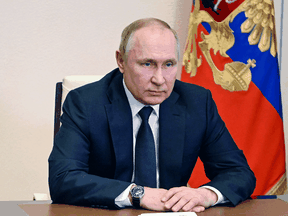Russia’s economy is both fragile and pathetically small for a giant nation with such abundant resources

Article content
Vladimir Putin’s Russia looks big and tough these days, a malign giant on the world stage.
Advertisement 2
Article content
There’s no doubt about the bigness. Russia has the largest area of any nation, 17 million square kilometres, followed by Canada, with nine million.
Russia occupies about 10 per cent of the world’s inhabitable land mass. The Soviet Union was even more vast, with 22.4 million square kilometres.
Putin appears to fret because his is no longer that much bigger than ours.
Russia also has a large, well-equipped military backed by nuclear weapons. This makes the Putin regime dangerous and murderous, as Ukrainians know all too painfully.
But behind the appearances lies reality: Russia’s economy is both fragile and pathetically small for a giant nation with such abundant resources.
The Russian system not only fails to create wealth by any standard of international success, but also diverts vast sums of existing resources to oligarchs.
Advertisement 3
Article content
“Russia has about two per cent of the world economy,” says U of C economist Trevor Tombe.
“Canada’s is slightly larger, just above two per cent. That sort of puts things in perspective.”
The comparison doesn’t mean Canada is economically weak, however. We do much more with our two per cent to generate wealth and benefit citizens. And our economy is the world’s ninth largest.
Among the rich G7 nations, Canada had a competitive per capita GDP of $43,000 in 2020, according to the World Bank. The U.S. ranked highest with $63,000.
Russia’s GDP per capita was only about $10,000. That’s after it fell by one-third during the era of low oil prices beginning in 2014.
Many countries large and small have higher per capita GDP than Russia, including Finland, with $48,000.
Advertisement 4
Article content
That’s one reason the Finns fear an invasion. Finland is a rich prize that the Soviet Union already tried to grab once, in the early months of the Second World War.
The first act was to bomb Helsinki and kill civilians. Twenty-one Soviet divisions swarmed into Finland. Sounds familiar.
But Soviet forces stalled miserably in the face of fierce resistance.
Soviet Leader Josef Stalin, worried that the West would intervene, eventually reached a settlement. The same scenario could play out now.
From another angle — total GDP by country — Canada still ranks above Russia, with $1.6 trillion compared to $1.5 trillion.
The numbers vary somewhat among sources, but the relationship doesn’t change: Canada’s economy is larger than Russia’s.
Advertisement 5
Article content
That’s true even though Russia’s population of 146 million is nearly four times Canada’s 38 million.
Russia strives to expand and conquer with even less economic power behind it than Canada would have, should this nation suddenly be stricken by steroid psychosis.
Wider comparisons also illuminate the weakness behind Putin’s pretensions.
The total GDP of the United States is about $20 trillion, more than 10 times Russia’s.
The U.S. spends a mammoth $778 billion on its military. Russia spends $61 billion, the world’s fourth-highest amount.
But America’s defence spending, gigantic though it is, amounts to only 3.7 per cent of its GDP. Russia’s military budget is 4.3 per cent of that country’s GDP.
The economic output of all 30 NATO countries facing Putin, including Canada and the U.S., is nearly $35 trillion.
And there’s Russia, with $1.5 trillion.
Economic strength and military might are not equivalent, of course. A dictator with ultimate power and dreams of conquest can do enormous harm.
But Putin is reaching far beyond his country’s capacities. That will do him in eventually.
Meanwhile, how tragic it is that Ukrainians suffer and die for his transitory delusions.
Don Braid’s column appears regularly in the Herald
Twitter: @DonBraid
Facebook: Don Braid Politics
Braid: Russia's economy is too small and weak to sustain Putin's delusions - Calgary Herald
Read More
No comments:
Post a Comment